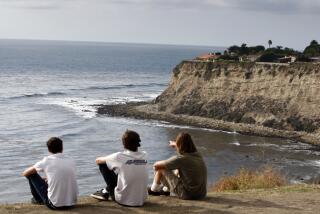Judges Rough Up New Zealand Cup Team : America’s Cup: In final day of two-year courtroom battle, New Zealand faces toughest questions. Some observers say San Diego Yacht Club has advantage if proceedings are indicator.
- Share via
ALBANY, N.Y. — New Zealand’s America’s Cup legal team fielded a barrage of sharp queries from New York’s highest court Thursday, while rival San Diego slid smoothly through the final court session of a two-year battle for yachting’s grand prize.
The one-sided questions from the seven-judge state Court of Appeals left some observers predicting the panel would send the Cup winging back to San Diego.
“From the tenor of the questioning,” said Jonathan Harvey, an attorney who joined the full house attending Thursday’s proceedings, “I would say the court was not pleased to have this case before it and would probably leave (a lower court ruling backing San Diego) alone.”
New Zealand millionaire Michael Fay brought the case to its final level here, claiming a one-sided Cup victory by San Diego’s ultralight catamaran over his huge, 132-foot monohull in September 1988 violated Cup standards of fairness.
Fay left hurriedly after the hour-long hearing, while his attorney, Robert Fiske, turned questions aside testily, saying: “We’re not going to reargue the case on the courthouse steps.”
Meantime, lawyers for the other side basked in the sun and reflected on their day in court.
“I thought the court asked the right questions,” said former U.S. District Judge Harold Tyler, who represented the San Diego Yacht Club. “It’s very good from our point of view. . . . The tough questions had to be put to (New Zealand).”
In court papers, New Zealand argued that the 139-year-old Cup competition always had been contested between relatively evenly matched boats, and it was San Diego’s obligation in 1988 to produce a fair match for Fay’s huge, challenging monohull.
The catamaran Dennis Conner sailed to easy victory “violated the concept of a fair match,” Fiske said, by giving New Zealand no chance to win.
But one judge after another challenged whether “fairness” was required under a literal reading of the century-old Deed of Gift that regulates the Cup.
“We’ve had different types (of boats) before,” said Judge Vito Titone.
“Where do you find ‘monohull’ in the language of the Deed?” demanded Chief Judge Sol Wachtler.
“Did the catamaran violate any of the Deed of Gift dimensions?” asked Judge Judith S. Kaye. When Fiske said no, she asked how, if both boats fell within the required dimensions, “We can say one is illegal?”
Tyler had a far easier time with the judges, answering far fewer questions during his 20-minute oration.
Wachtler asked lightheartedly if the 1988 match wasn’t between “a Ferrari and a New York city bus,” but the only tough line of questions came from Judge Stewart F. Hancock Jr.
He suggested the San Diego Yacht Club had a double duty as Cup defender both to oversee a fair competition and to try to successfully defend the Cup, which he said could put the club in a conflict of interest.
Tyler responded: “Yes, but what did my client do to specifically violate the Deed?” He argued that since the Deed requires a defender to both manage the races and to compete, San Diego had no choice.
If Fay’s camp took any solace from the proceedings, it would be in the fact the court accepted an amicus brief from 15 high-profile former Cup competitors, including Ted Turner, supporting Fay’s “fairness” contention. It turned down a rival brief from veteran sailing-rules experts in support of San Diego on grounds the document was filed too late.
A final ruling is expected within two to three months. If it goes San Diego’s way, race organizers there said Thursday they would schedule an international Cup regatta for up to 20 competitors in May 1992.
If the court awards the prize to New Zealand, Fay’s spokesmen said a regatta could be organized at about the same time in Auckland. The event is said to be worth $1.2 billion to the host city.


